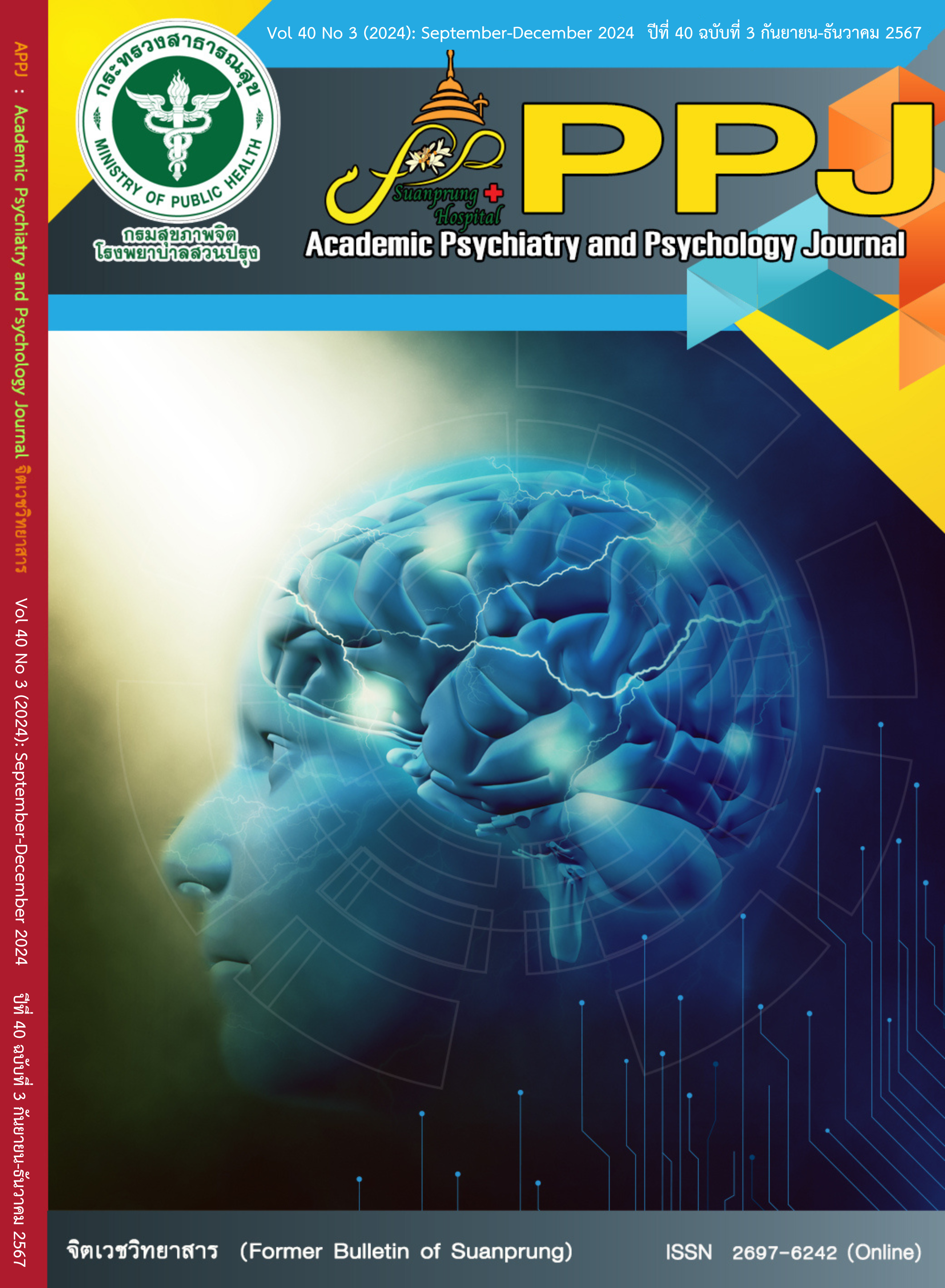The Effect of Hope Enhancement Program with Family Participation on Depression of Diabetes Mellitus Type 2 Patients with Major Depressive Disorders
Main Article Content
Abstract
Objective: To study the effect of Hope Enhancement Program with family participation on depression of diabetes mellitus type 2 patients with major depressive disorders.
Methods: This is a quasi-experimental study with two groups measuring before and after. The sample group was 50 patients with diabetes mellitus type 2 patients, selected purposively, and divided into an experimental group and a control group; each group had 25 people (pairs). The experimental group received the hope enhancement program with family participation for four weeks, while the control group received normal nursing care. Research tools include: 1) Beck's Depression Scale 2) Family Participatory Hope Enhancement Program. Data were analyzed using descriptive statistics and t-test.
Results: After receiving the program, the average score of post-depression was significantly lower than before receiving the program (p<.05) and the average depression score of the experimental group after receiving the program was significantly lower than that of the control group (p<.05).
Conclusion: This indicates that the Family Participatory Hope Enhancement Program can help reduce depression in diabetes mellitus type 2 patients. Therefore, this program should be used to help reduce depression in diabetes mellitus type 2 patients.
Article Details

This work is licensed under a Creative Commons Attribution-NonCommercial-NoDerivatives 4.0 International License.
บทความหลังผ่านการปรับแก้จากกองบรรณาธิการแล้ว เป็นลิขสิทธ์ของวารสารจิตเวชวิทยาสาร โรงพยาบาลสวนปรุง กรมสุขภาพจิต กระทรวงสาธารณสุข ห้ามเผยแพร่เพื่อประโยชน์ทางการค้าโดยไม่ได้รับอนุญาต แต่อนุญาตให้เผยแพร่บทความดังกล่าวเพื่อประโยชน์ทางการศึกษาแก่ประชาชนทั่วไป ทั้งนี้กองบรรณาธิการไม่จำเป็นต้องเห็นด้วยกับบทความหรือข้อคิดเห็นใดๆ ที่ปรากฏในวารสารสวนปรุง
References
World Health Organization [Internet]. The top 10 causes of death. [Cite 2019 Jan 6]
Available from: https://www.who.int/news-room/fact-sheets/detail/the-top-10-
causes-of-death.
Diabetes Association of Thailand. [Internet]. Bangkok: 2018. [cited 2019 Apr 13].
Available from: https://www.dmthai.org/new/images/knowledge/knowledge.
Ismail K. et al. Type2 diabetesmellitusasarisk factor for the onset ofdepression: a
systematic reviewandmeta-analysis.Diabetologia. 2010; 53:2480-6.
Golden SH, Lazo M, Carneton M, Bertoni AG, Schreiner PJ, et al. Examining a
bidirectional association between depressive symptoms and diabetes.
JAMA. 2008; 299:2751-9.
Mental Health Department Ministry of Public Health. World Mental Health Day [Internet].
[cited 2021 Apr 02]. Available from: www.klb.dmh.go.th/modules.
php?m=news&gr=op=detail& news_id-9.
Rungreangkulkij S, Kittiwatanapaisan Y, Kittiwatanapaisan W, Kotnara I, Kaewjanta N.
Prevalence and Factors of Depression among Type 2 Diabetic Patients. J Psychiatr
Assoc Thailand. 2014; 59:287-98. (in Thai)
KhalediSardashti F, Ghazavi Z, Keshani F, Smaeilzadeh M. Effect of Hope Therapy on the
Mood Status of Patients with Diabetes. Iran J Nurs Midwifery Res. 2018; 23(4):281-286.
doi:10.4103/ijnmr.IJNMR_36_16
Naeungjaknak A. Depression in Patient with type 2 Diabetes in Chaophya Abhai
Bhubhjhr Hospital, Prachinburi Province. Chulalongkorn University; 2017. (in Thai)
Wongtongmana N. Psychiatric Nursing: Practice Guideline. Bangkok: Chulalongkorn
University Press; 2019. (in Thai)
Van den Akker M, Schuurman A, Metsemakers J, Buntinx F. Is depression related to
subsequent diabetes mellitus. Acta Psychiatrica Scandinavica. 2004; 110:178-83.
(in Thai)
Stoop CH, Nefs G, Pommer AM, Pop VJ, Pouwer F. Effectiveness of a stepped care
intervention for anxiety and depression in people with diabetes, asthma or COPD in
primary care: A randomized controlled trial. J Affect Disord. 2015; 184:269-276.
doi:10.1016/j.jad.2015.05.063
Snyder CR. The Psychology of hope: You Can Get There from Here. New York:
Free Press; 1994.
Masjedi AA, Yoosefee S, Hejazi S, Jahangirzade M, Jamshidi MA, Heidari M,
Farhoush M. Effectiveness of an Islamic Approach to Hope Therapy on Hope,
Depression, and Anxiety in Comparison with ConventionalHope Therapy in Patients
with Coronary Heart Disease. Journal of Advances in Medical and Biomedical
Research. 2020; 28:82-9.
Winarsunu T, Utami LA, Fasikhah SS, Anwar Z. Hope therapy: Can it treat hopelessness
and internal locus of control on diabetes mellitus patients?. PLoS One.
; 18(6):e0286418. Published 2023 Jun 13. doi:10.1371/journal.pone.0286418.
Darlington, Y., & Bland, R. (1999). Strategies for encouraging and maintaining hope
among people living with serious mental illness. Australian Social Work., 52(3),
-24.
Polit DE, Becker CT. Nursing research principles and methods. 7th ed. Lippincott;
Beck AT, Steer RA, Brown G. Manual for the Beck Depression Inventory-II.
San Antonio: Psychological Corporation; 1996.
Thamrongchaichana J, Laohasiriwong W, Thinkamrop W. Situations and factors related
to Depression among patients with type 2 diabetes in Khon Kaen Province. Journal of
Health and Health Managemen. 2023; 45:613-31. (in Thai)
Cheavens JS, Feldman DB, Gum A, Michael ST, Snyder CR. Hope therapy in a
community sample: a pilot investigation. Social Indicators Research. 2007; 7:61–78.
Noppasod P, Suntornchaiya R. The Effect of Hope Enhancement Program with Family
Participation on Depression of Older Persons with Major Depressive Disorders. Journal
of the Police Nurses. 2015; 7:83-94. (in Thai)
Uncapher H, Gallagher T, D, Osgood NJ. Hopelessness and suicidal ideation in older
adults. The Gerontologist. 1998; 38:62-70.

